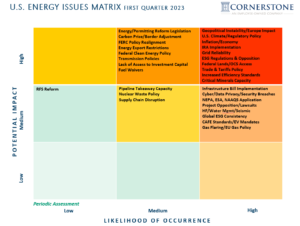Geopolitical instability and U.S. climate and regulatory policy were dominant U.S. issues in the First Quarter 2023. The war in Ukraine, China’s military posturing in the Indo-Pacific Region, and changing geopolitical alliances that involve China, Russia, Iran, and Saudi Arabia are impacting the flow, consumption, and future supply of oil and natural gas globally. U.S. LNG exports and mild weather helped Europe avoid a catastrophe this past winter as Russian gas was turned away and diverted elsewhere. U.S. Climate /Regulatory Policy increasingly impacted how traditional energy sources like oil and gas were being developed while increasing the investment and development of renewable energy. Implementation of the Inflation Reduction Act (IRA) resulted in a number of announcements regarding strategic alliances and investments in decarbonization technologies like carbon capture and storage, as companies reacted to the tax incentives and grants made available through its programs.
While initial reaction in Europe to the IRA’s passage was quite negative, with potential implications for trade and tariffs policy, Europe has become less hostile to the IRA and vowed to adopt similar measures. Some U.S. politicians are considering adopting carbon pricing or a Carbon Border Adjustment Mechanism (CBAM) similar to what is being implemented by the European Union. Additionally, trade and tariff policies with China and Iran continue to impact the energy industry globally, even as supply chain issues that were so impactful last year appear to be becoming less so in 2023.
U.S. oil and gas production moved to near record levels as high demand and global commodity prices put production at near capacity. A lack of investment capital for the sector, a desire by companies to maintain fiscal discipline, and cost, equipment, and labor constraints made it difficult for producers to increase production much more. Another challenge has been a lack of running room for new production as the federal government continued to lag behind in putting forth a new offshore oil and gas drilling program and pulls back on federal acreage offered onshore.
Demand for renewable energy increased during the quarter, but three factors threaten the delivery of future supplies of green energy: U.S. critical minerals capacity, grid reliability, and permitting. To address the permitting situation, Sen. Joe Manchin (D-WV) introduced a legislative package last year that failed to move through Congress, although he is still determined to push it through this year. Meanwhile, the House of Representatives introduced H.R. 1, a comprehensive energy bill largely focused on traditional energy forms that addresses permitting, access, and supply-related issues. While this passed the House, a compromise with the Senate will be necessary in order for components of the bill to become law.


